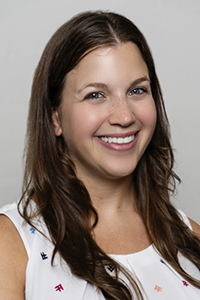The field of Pediatric Gastroenterology is a broad one and New York Medical College and its affiliated hospital, The Maria Fareri Children's Hospital at Westchester Medical Center, offer a vast panorama of clinical and research opportunities. To optimize the educational experience, each fellow is encouraged to take an active role in conjunction with the program director in designing his own program.
The Pediatric Gastroenterology Fellowship adheres to the requirements for Pediatric Gastroenterology certification by the Gastroenterology Subboard of the American Board of Pediatrics, and is fully accredited by the Accreditation Council for Graduate Medical Education. The goals of our three year program are to provide:
- A base of scientific skills and expertise that will ultimately allow fellows to become independently functioning and funded investigators
- Skills to provide expert clinical care for infants, children and adolescents with disorders of the digestive system
- A solid knowledge base and skills to guide, instruct and teach others the fundamentals of GI function and clinical care
- To build administrative and time management skills
Description of Training
1. Clinical Training
At least 12 of the 33 months will be spent primarily on clinical service. The Pediatric Gastroenterology, Hepatobiliary and Nutrition Division of New York Medical College cares for the entire spectrum of GI disorders in patients varying from 500-gram neonates to adolescents and beyond. The bulk of the clinical experience will be in the faculty practice of New York Medical College and the inpatient facilities of the Maria Fareri Children's Hospital at Westchester Medical Center.
The Gastroenterology inpatient service at the Maria Fareri Children's Hospital is one of the major strengths of the training program. WMC serves as the only tertiary care referral center located within an area of seven counties with a population of over 3 million. As the only Pediatric Gastroenterology Division in the area, essentially all children requiring subspecialty services are referred to the division. The hospital has a stated policy to never turn down patients who need tertiary care. Each trainee will spend at least 12 months "on-service" during the 3-year program. The daily inpatient census varies from 5 to 15 patients. In addition, we average 1 to 3 new consults daily, many of which require daily follow-up. This includes patients in both the Neonatal ICU and Pediatric ICU. Therefore, the GI service follows between 8 and 20 patients daily.
The liver transplant program at Westchester Medical Center is an active, thriving service. We average approximately 4 pediatric transplants per year. Our fellows are intimately involved in all aspects of pre and post transplant care and work closely with the transplant surgeons and hepatologists in providing care.
In addition to an active inpatient service at WMC, each fellow will have scheduled office hours in the faculty practice, where he or she will follow their "own" patients with chronic GI disorders throughout their fellowship. This continuity of care is an essential part of the training, and is affiliated with the pediatric faculty practice, http://www.cwpw.org.
The Pediatric Gastroenterology, Hepatology and Nutrition Division has a huge outpatient program, with approximately 10,000 outpatients per year. This translates into, on average, 120 patients per week in our outpatient facilities, of which approximately 20 - 30 are new. Essentially all patients are referred from their primary care physicians, and our faculty cares for all children regardless of their health insurance status or their ability to pay.
2. Educational Program
Our division has four hours of conferences per week. Each fellow is expected to attend and participate in the following division conferences:
- Divisional Educational Conference Weekly
- Adult GI Grand Rounds
- Pediatric Grand Rounds
- Interdisciplinary Surgery Conference
- Pathology Conference
- Radiology Conference
Seminars are also designed by the faculty on statistics, research design, ethics of clinical research, and operational aspects of a pediatric gastroenterology facility.
Senior fellows are also expected to attend our transplant recommendation and review conference weekly.
There is a steady schedule of basic science and research conferences in the many departments of the medical school.
It is expected that each graduate of the training program will be skilled in teaching. Toward that aim, each fellow will be required to organize and deliver conferences to the division, the house staff and to the department with gradually increasing responsibility through the three years.
3. Research Training
The research component of the program is given equal weight to the clinical program. A minimum of 12 months will be devoted to research during the three- year program. It is expected that the fellow will develop projects in both basic and clinical research, and follow these projects through until completion and publication. Our fellows work closely with Dr. Marvin Medow, Ph.D. a member of our division who devotes much of his time to autonomic dysfunction and how it relates to the digestive system.
Clinical projects are ongoing in our division and it is expected that fellows are involved in initiating and implementing research studies and case reports. The fellow will meet with the program director frequently to help shape and focus the trainee’s research interests and design a program that is stimulating and productive. The goal is to have the research program tailored to the individual and organized so that the trainee can be productive as soon as the heavy clinical demands of the first year start to wane.
Each fellow is expected to develop at least one independent project, from inception all the way through to publication, with the fellow acting as first author (principal investigator.) In addition to intramural presentations of their work, fellows will be encouraged to present their data in abstract form in appropriate national and international scientific conferences in addition to submitting their data for publication in a peer-reviewed journal.
4. Pediatric Endoscopy
Fellows receive training in procedural skills, including esophagealduodenalgastroscopy and colonoscopy, liver biopsy and advanced endoscopic techniques. The division averages 1500 procedures per year, all which trainees participate in.
In addition fellows become experienced in lactose breath testing, esophageal and rectal mannometry as well as skilled in interpreting pH probes and capsule endoscopy.
5. Electives
Senior fellows spend one-month electives with the adult GI service to perfect advanced techniques as well as become familiar with ERCP and Endoscopic ultrasound.
During the third year, a second one-month elective is exclusively devoted to hepatology during which time the fellow is immersed in transplant care, including clinics and conferences.
Outside electives are a possibility and need to be discussed with the program director and ACGME staff at Westchester Medical Center.
Facilities and Resources
The Pediatric Gastroenterology, Hepatology and Nutrition division has a 12 physician faculty with a very wide range of clinical and research interests. This assures each trainee of the opportunity to be exposed to all facets of our field. Our faculty is currently involved in dozens of research projects, ranging from cell and molecular biology, clinical trials, and epidemiological research. Fellows may choose any of the faculty as mentors in research.
New York Medical College, which has been training physicians since 1860, is one of the largest medical schools in the United States. The main campus moved to Westchester from New York City over 15 years ago, and this move has sparked an extraordinary growth in both the research and patient care roles of the medical school. The Department of Pediatrics has likewise grown at a fantastic rate, with all subspecialists very well represented. There are huge opportunities for each fellow to interact with basic scientists and clinical scientists in all fields of medicine.
The Maria Fareri Children’s Hospital at Westchester Medical Center is a major teaching hospital of New York Medical College. It serves as the only major referral center for the seven counties in the lower Hudson Valley, and has the highest “case-mix index,” which is a measure of acuity, in the state. Our helicopters bring children in daily from a very expansive geographic region. The focus is on tertiary and critical care. We are always at or above 100% census with transports of critically ill children occurring daily. In 2004, the magnificent Maria Fareri Children's Hospital at Westchester Medical Center opened, and continues to expand in size and scope of programs offered. MFCH is dedicated to family-centered care and is a truly beautiful facility. All patients have private rooms and parents are encouraged to stay 24 hours a day. More information about our new Children’s Hospital can be obtained by visiting our web site:http://www.worldclassmedicine.com/home_mfch.cfm?id=65.
Duration of Training
A minimum of three years is required. It is expected that there will be a progressive development of clinical, teaching and research skills during the program.
Current Fellows
Third Year Fellow

Apoorva Nanagiri, MBBS
Medical School: Osmania Medical College
Residency: Nassau University Medical Center Program (Pediatrics)
Second Year Fellow

Samantha Hayle Pravder, DO
Medical School: Philadelphia College of Osteopathic Medicine
Residency: Westchester Medical Center (Pediatrics)
First Year Fellow

Cameron Chow, MD
Medical School: St. George's University School of Medicine
Residency: SUNY Downstate Health Sciences University (Pediatrics)
Alumni
Michael Thomas, MD
Program Eligibility
Applicants are eligible for the program if they meet the following requirements:
- Have completed (or will complete by July 1st of expected start year) an ACGME-accredited residency program
- Have passed all components of the U.S. Medical Licensure Examination, including:
- Step 1
- Step 2 (Clinical Knowledge)
- Step 2 (Clinical Skills)
Step 3
- Have fulfilled the eligibility requirements for certification by the American Board of Pediatrics
International applicants must also provide evidence of the following:
- Certification by the Educational Commission of Foreign Medical Graduates (ECFMG). Information on ECFMG Certification may be obtained at http://www.ecfmg.org
- Successful completion of the ECFMG English Examination
Application Process and Requirements
To apply to our fellowship program, please complete an application through the ERAS, the electronic residency application service offered by AAMC. Their website is: https://www.aamc.org/
We accept one new fellow each year. Applications are encouraged to be submitted 18 months prior to the start of training.
Please be sure to include the following items in your application:
- ERAS Common Application Form
- Current Curriculum Vitae
- At least three letters of recommendation, including one from your pediatric residency program director (More than 3 letters are encouraged.)
- Medical School Dean’s letter (same as required for residency)
- USMLE Scores Step 1, 2, 3
- Board scores
- Personal statement
- We would appreciate a description of your clinical and research experience, your reason for an interest in Pediatric Gastroenterology, and your career goals.
- Research background/publications
A personal interview is required and will be granted to the most qualified applicants. We expect each applicant invited to interview to devote an entire day with us. Interviews are usually scheduled from January to the end of April. Application deadlines are sometimes flexible.
Application Timeline and Selection Procedure
- November - ERAS opens for applications.
- December - Programs download applications and determine interview invitations.
- Dec-April - Selected applicants will be invited to interview.
- January - Applicants and program register with NRMP.
- April-May - Applicants are ranked on basis of prior performance, letters of recommendations, personal interviews, and academic promise.
- June - Match Day
- July 1 - Fellowship start date one year after match